Purification#
Observing cleanliness of the body and the cloth is a very fundamental practice in Islam. Islam tied down being in a clean body and wearing a clean cloth, with performing the prayer five times per day. Purification is a condition for accepting prayers, fasting, and Hajj in Islam.
Islam defines what is impure and how you can return to a state of cleanliness. In this chapter, we will go through the most important topics in the Taharah.
Taharah can be divided into two main categories: purification of physical impurity (called Najas in Arabic) and purification from state of impurity (called Hadath in Arabic).
Najas#
The Najas is a physically impure substance that could contaminate the body, clothes, or places. We need to remove najas from our body, clothes, our places. We need to remove the impure substance, then clean and wipe its place with water.
Here is a list of Najas:
- Urine (either from Human or Animals).
- Feces (either from human or animals. There is an exception for the animals that are permitted Islamically to eat).
- The blood of menstruation, false-menstruation and post-natal bleeding. Note: the sexual intercourse between couple during woman’s period is forbidden.
- Seminal fluid, pre-seminal fluid and wady (a thick white secretion comes out of the penis without sexual pleasure, and discharged after urination.) This is applicable to males and females.
- Vomit and Regurgitation. Regurgitation, where is what comes out of the throat into the mouth, but does not leave the mouth. Therefore, it is not permissible to return it to the stomach.
- Nosebleed
- Spilled out Blood from its place. For example, the blood that comes from the wound. However, the blood that remains on the flesh of the animal after slaughtering is not najas.
- Pig and all its parts are najas.
- Dog. Therefore, if wet contact with dog, should be washed and cleaned. The Prophet’s (Peace be upon him) said: “When a dog licks a utensil belonging to any one of you, [the thing contained in it] should be thrown away and then [the utensil] should be washed seven times, using soil for the first and the last time”.
- Any wild beast with a fang (such lion, tiger, etc…) or Bird with a claw (such falcon, eagle, etc…).
- Al-Jallalah: it is a name for the animal which eats or fed with filth and najas. They are considered najas until they are purified. It must be quarantined and fed with proper food for at least day and night for birds, three days for sheep, and seven days for camels and cows to get the najas out of its body.
- Dead animals without being slaughtered legitimately. There are exceptions to this rule as follows: a) wool, hair, fur, feather tips and what was tanned of leather
b) Dead locusts and dead fish.
c) Dead insects that do not have flowing blood like houseflies, beetles, and scorpions.
d) A fetus whose mother been Islamically slaughtered.
e) The hunted prey if the name of Allah recited before releasing the arrow or bullet.
You should avoid contact with all these types of najas. If you get wet contact with any of them, you must wash that area with water.
Hadath#
Hadath is a non-physical state that breaks the legal state of purity. It is a state that prevents one from performing some acts of worship such as Prayer, Fasting, tawaf (circumambulate around the Kaaba) and reading the Quran.
Hadath are classified into two categories:
-
Minor: This happens when you release any najas (except the seminal fluid, as it causes Major Hadath) or get wet in contact with it. Lost of consciousness (sleeping and any other reason) is considered to cause minor hadath as well as engaging in any action that is unlawful in Islam, such as backbiting, telling lies, vain talk and so on.
If you have minor hadath you can’t observe prayer, touch the Quran physically and circumambulate around the Kaaba.
You can get back to the taharah state by removing the kinds of najas, cleaning its place with water and performing Wudu.
-
Major: First case of major hadath is Janabah. Janabah happens when you release seminal fluid (ejaculation, sexual intercourse, wet dreams). Janabah also happened if perform sexual intercourse even without ejaculation.
The second case is when women become pure after menstruation. The third case is when women become pure after postnatal bleeding (usually 40 days).
If you have a major hadath you can’t observe prayer, Fasting, reciting/writing/touching the Quran and entering mosques.
You can get back to the taharah state by removing the najas, cleaning its place with water and performing Ghusl (ritual bathing).
Water is the only purifier that lifts Hadath when it is available. We are talking here about the absolute water (water does not mix with anything). Examples of absolute water are the tap water, rain water, river water, well and spring water, seawater, and water from snow and hail.
If the water characteristics changed due to:
- Long period of time and stagnation.
- Changed by something generated by the water itself, such as algae.
- Changed by an inseparable pure substance such as salt, tree leaves and soil.
All that changes in characteristics are acceptable, and such water is considered absolute water.
However, if the absolute water is mixed with a pure, separable substance (such as soap, saffron, flowers and so on), it is no longer considered suitable to lifts Hadath. It can be used to remove the najas.
If the water is contaminated with an impure substance (najas), and consequently, its color, taste, or smell has changed, it cannot be used to clean the najas or lift Hadath.
Before we go to Wudu and Ghusl, I would like to discuss the toilet etiquette.
Answering the call of Nature Etiquette#
Going to the toilet involves a lot of najas. It is not permissible to perform prayer while holding urine or feces. Islam has some rules and manners when answering the call of nature. Here is a summary of them:
- The place where you will relieve yourself must be concealed, so no one can see, hear, or listen to you. Furthermore, the place should be low, absorbent, and not facing the wind to prevent urine from sprinkling around and touching the body or clothes.
- You should not cause harm to others: like doing it on pathways, public sitting areas, stagnant water, …etc.
- You should not be facing Al-Qiblah (the direction of Makkah) nor turn your back towards it, if you are in an open area.
- Don’t do it in the natural holes.
- Don’t carry with you the Quran or anything that has the name of Allah on it when you are answering the call of nature.
- You should enter the place with your left food first and say: “allahumma inni a udh bika min al-khubuthi wa al-khbaith”, meaning: “O Allah, I seek refuge with you from devils -males and females”. When leaving the toilet, he should say: Ghufranak (I seek Your forgiveness).
- It is important to remain silent while answering the nature call. It’s strongly discouraged to talk or start or answer greetings.
- You should not lift your garment until you had squatted close to the ground. In (modern) toilet, you should not lift your garment until you have closed the door and are out of sight of other people. You should not urinate standing.
- You should be careful to remove all impurity after answering the call of nature. One should not remove impurity with his right hand. The left hand should be used for this purpose.
- You should not use bones or dung to clean yourself or wipe away the impurity, rather, you should use tissue, stones, and the like. This process is called Istijmar. It is recommended, but not compulsory. The compulsory is using absolute water to wash the impurity (It is called Istinja). Any impurity should be washed or wiped three times or an odd number of times greater than three.
- It is recommended that males clean their urinary organ through what is called Istibrah. Istibrah is removing the traces or remnants of urine left in the penis by pressing it from its beginning to its end to make sure there are no drops left. Furthermore, for the men, it is not recommended that one touch his genital area with his right hand when urinating.
Now, we will go through Wudu and Ghusl.
Wudu#
Ablution (wudu) is the most frequent cleaning practice in Islam. Muslims do wudu at least five times per day.
How to perform Wudu#
Step 1: Make an intention in your heart to get rid of the impurity in your body by doing a wudu.
Step 2: Say “Bismillah”.
Step 3: Wash both hands up to the wrist three times. Make sure that water reaches all parts of the wrist, including in between the fingers.
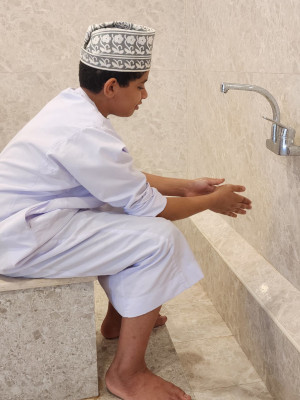
Step 4: Using your right hand, put a handful of water into your mouth and rinse it thoroughly and gurgle in as deep as possible. Do this three times.
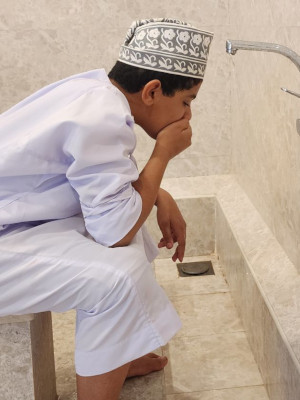
Step 5: Again, using your right hand, sniff water into your nostrils as far as possible to clean them. Wipe any mucus away with your left hand. Do this three times.
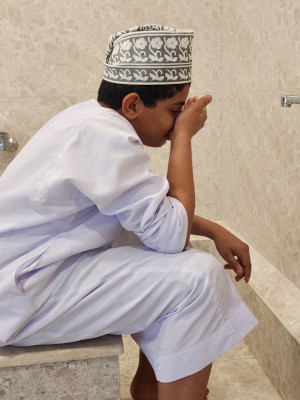
Step 6: Using both hands, wash your face three times, wiping from your forehead to your chin and extending the palm of your hands to cover your face from ear to ear.
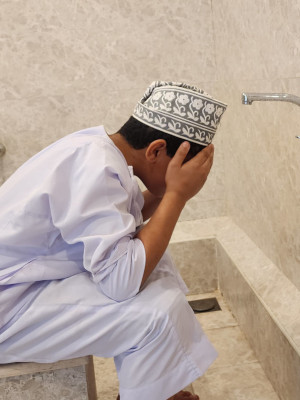
Step 7: Wash your arm up to and including the elbow three times, ensuring you cover the area in between the fingers. Start with the right arm and then the left arm.

Step 8: Wipe the head with both wet hands once, from the front to the back.

Step 9: Wipe the inside of your ears using your wet fingers, at the same time wipe the back of the ear lobes with your thumbs. Do this only once.
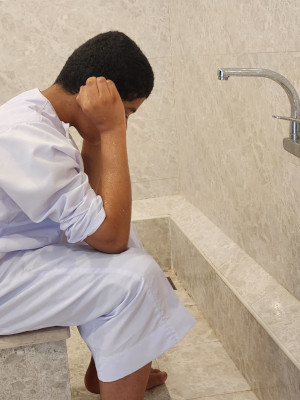
Step 10: Wash the foot including the ankle three times, ensuring you wash the area in between the toes and also the sole. Start with the right foot and then the left foot.
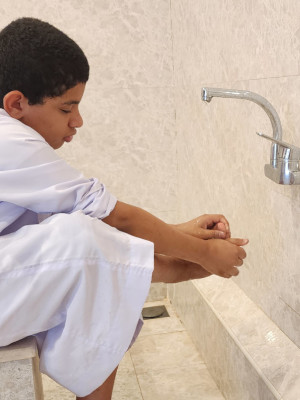
After completing the wudu, it is recommending to make this duaa:
Ash’hadu an laa ilaha illa Llah La sharika lahu, wa ash’hadu anna Muhammadan ‘abduhu wa rasuulu Llah.
I bear witness that there is no deity worthy of worship except Allah and I bear witness that Muhammad is his slave and the Messenger.
Notes:
- Water should reach all the parts required to be washed. Therefore, you need to remove any make-up, cosmetics, or clothes.
- If you have a wound or nostrils that continue to bleed, you should cover the part (to contain the blood) and continue with the wudu. This principle is also applicable to a woman who experiences bleeding outside of her regular cycle.
- Don’t waste water. Wudu could be performed with one liter of water!
Ghusl#
A ritual bathing (Ghusl in Arabic) was required for the purification from the major hadath. It involves bathing the whole body as the follow:
How to perform Ghusl#
Step 1: Make an intention in your heart to get rid of the impurity in your body by doing a ghusl.
Step 2: Pass urine (if possible; this is recommended and is intended to clean semen from the urinary passage).
Step 3: Wash the private parts from the navel to the knees and any part of the body which came into contact with any of the physical impurities.
Step 4: Say “Bismillah”.
Step 5: Perform Wudu as done for prayers.
Step 6: Wash the entire body thoroughly with water, beginning with the upper parts before the lower parts, and the right parts before the left parts.
Tayammum#
There are some cases that you can’t find/use water to perform wudu or ghusl. In such case, you need to perform dry ablution (tayammum) using clean earth (sand or dust). Tayammum can replace wudu in the following conditions:
- Water is not available.
- Inability to use water due to extreme clod, sickness, so on.
- The available water is required for drinking.
- Fear missing the prayer time.
How to perform Tayammum#
Step 1: Make an intention in your heart to get rid of the impurity in your body by doing a tayammum.
Step 2: Say “Bismillah”.
Step 3: Strike clean soil with the palm of your hands, shake off loose earth, and then wipe your face once as you do in ablution.
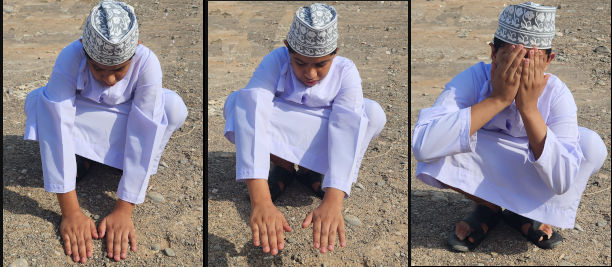
Step 4: Strike clean soil with the palm of your hands again, shake off loose earth and then, with the left palm, wipe the back of the right hand from the tips of the fingers to the wrist. Then, with the right palm, wipe the back of the left hand from the tips of the fingers to the wrist.
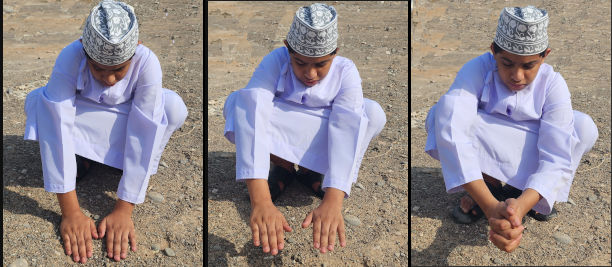
Hygiene Practices#
There are hygiene practices that should be followed in Islam. They called Sunan al-Fitrah.
- Clipping the nail: It is not appropriating to delay it for more than 40 days. Cut the nails because if you leave it, dirt will collect under it.
- Shaving pubic hair: It is not appropriating to delay it for more than 40 days for men and 20 for women. You can take it off without shaving, like with hair removals creams.
- Plucking armpit hair: It is not appropriating to delay it for more than 40 days. It is the removal of hair that grows in the armpit, whether it was removed by plucking, shaving, or otherwise. Because it removes it from the cleanliness and cuts the foul odor.
- Circumcision: Obligatory for men. The cut of skin that covers the glans prevents dirt from gathering in it and keeps it clean of urine.
- Trimming mustaches: It is not appropriating to delay it for more than 40 days.
Menstruation#
In this section, I would discuss menstruation more, as it is an important topic for Muslim women. Menstruation is the release of blood and tissue through the vagina, which occurs on a monthly cycle. It is not caused by specific events, such as birth or breakage of the hymen. It starts as early as 9 years until the menopause (60 years). The blood of the menstruation is black, thick, and foul-smelling.
In case of doubt, a woman should wipe her vulva with a piece of clothing from left to right while between a standing and sitting position. She does not suppose to look inside the vagina. She must not stop praying/fasting, if the blood does not flow out the vulva.
Menstruation lasts from three to ten days. If blood flows for less than three days, it is not considered menstruation. What’s more, if it lasts more than ten days, it is a prolonged period which not considered as menstruation. Therefore, if the blood flows does not meet the menstruation criteria, the woman must observe the Prayers/Fasting immediately and redo what she missed in the period when she thought she was on menstruation. In that case, women should use sanitary napkins, for example, to contain the blood while observing prayers/fasting.
For example, If a woman has first time menstruation for more than 10 days. After 10 days, she must consider the menstruation is over. Therefore, she must perform ghusl and observe the prayer/fasting. She should seek a medical advice why the menstruation prolonged.
Note: If the prayer time comes then the woman get the period before she prays, she needs to redo the missed prayer after get out of period and perform the ghusl. It is recommended to do prayer as soon as its time starts to avoid such cases.
The menstruation period duration could change from month to month. It is recommended to keep a track record of the period on a monthly basis (i.e., start Date and time, End Date and time, remarks if any). The duration is calculated by hours. Here is the table:
| Month | Start Date:time | End Date:time | Remark (duration) |
|---|---|---|---|
| Muharram | |||
| Safar | |||
| Rabi’ al-awwal | |||
| Rabi’ al-akhir | |||
| Jumada al-awwal | |||
| Jumada al-akhir | |||
| Rajab | |||
| Sha’ban | |||
| Ramadan | |||
| Shawwal | |||
| Dhul-Qa’dah | |||
| Dhul-Hijjah |
The regular period duration will be stable after 3 consecutive period cycles with the same duration.
The table below shows what the minimum and maximum durations limits of each event. The duration of each event must not be less than the minimum duration and must not exceed the maximum duration.
| Time | Minimum | Maximum |
|---|---|---|
| Menstruation | 3 days | 10 days |
| Cleanliness State | 10 days | No limit |
Signs of Cleanliness#
The milky discharge (the whites): this is a very milky and watery secretion that a woman considers as a sign of her cleanliness from menstruation, provided that it flows from the same place that menstruation flows from. The milky discharge is the strongest, unquestionable sign of cleanliness.
Vaginal Dryness: dryness happens when menstruation completely finishes and the place of blood secretion (vulva) becomes pure and clear. If a woman places cotton on the vulva, it won’t get stained. This is an indicator of cleanliness for women who normally clean by dryness instead of experiencing the milky discharge (the whites).
Completing the ten days: If the woman’s period prolongs for more than 10 days, she must consider menstruation is ended. She must perform ghusl and observe the prayer/fasting.
Please note that mucous discharges have the same rules as what comes before them. The cut-off is the menstruation blood or the whites.
Waiting Period#
This topic concerns only the woman who established her regular period days. It is well known the period duration is not fixed. It is possible that the duration of the period could be extended or reduced.
Waiting time is the period that a woman adds to her regular period days if blood continues to flow or if she experiences any of the mucous discharges after her usual period days are over. Waiting with a flow of pure blood is two days. While waiting with the mucous discharges is a day and a night (24 hours). Subsequently, she considers her menstruation is over.
If a woman is on the waiting period, and she has mucous discharges, then, if blood flows before the day and night are over, she has to wait for two days. This is because it is mandatory to consider blood as stronger evidence of menstruation than mucous discharges alone.
If the menstrual cycle lasts longer than usual for three consecutive periods with the same length, the new regular will be established. For the lighter menstrual cycle, the new regular will be established after two consecutive period cycles with the same duration.
Returning Menstruation#
There is a rare case called returning menstruation (only the woman who established her regular period days): where blood flows for certain days, then stops for certain days, then resumes again. The total days of the cycle (i.e., flows, stops, and flows again) should not exceed the 10 days, and the same thing happened three times in a row. In the stopping period, the woman must perform ghusl and observe prayers or fasting.
For example, a woman has a period of 5 days. Then the blood stopped for two days, and then the blood returned for two days. This cycle happened three times, with exact durations. As a result, she should consider that its period is nine days (5+2+2). However, on the stop days, she must perform Ghusl and observe prayers or fasting.
Another example: a woman has a period of 7 days. Then the blood stopped for two days, and then the blood returned for three days. This blood should not be considered a return to menstruation. She must not stop praying or fasting for it.
Post-Natal Bleeding#
Post-natal bleeding is the blood, which flows from women who have recently given birth (delivered a child) to either a complete or incomplete (miscarried) child. The shortest period of post-natal bleeding lasts ten days. The longest is about forty days.
If the woman finds out the signs of cleanliness (the whites, dryness or completing 40 days), she must perform ghusl and observe the prayers/fasting.
If the woman has established a regular time for post-natal bleeding (after giving birth 3 times and experiences the same duration), she must wait 3 days for pure blood or one full day (24 hours) for the mucous discharge over his regular timing. Then she considers the post-natal bleeding is over.
This is if the woman delivered a full-grown baby. If the woman miscarries, then the post-natal period depends on what the miscarried portion is. If she gives birth to a complete child, then she confines for forty days as demonstrated above.
However, if she miscarries and gives birth to an incomplete child, then her post-natal period differs as shown in the table below.
| Types of miscarriage | Period of pregnancy | Post-natal periods |
|---|---|---|
| Tiny (tadpole) | 40 days | 4 days |
| Blood clot | From 41 to 80 days | 7 days |
| Embryo | From 81 to 120 days | 14 days |
| Bone without flesh | From 121 and on | 21 days |
| Complete baby | 40 days |
Sources of this chapter#
1- The Reliable Jurisprudence of Prayer, al-Mu‘tașim Sa‘īd al-Ma‘walī, First Edition, 2017.
2- SALAA PRAYER Guide for New Muslims, Muharram 1441 / September 2019 , Islamic Information Center Sultan Qaboos Grand Mosque, Muscat, Sultanate of Oman.
3- المدخل إلى أحكام الحيض والنفاس، عزة بنت محمد بن سالم العيسرية، 2006، الإصدارة الثانية.
Next chapter is about Prayer